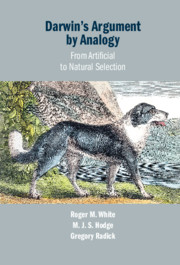Book contents
- Darwin’s Argument by Analogy
- Additional material
- Darwin’s Argument by Analogy
- Copyright page
- Contents
- Preface
- Introduction
- Chapter 1 Analogy in Classical Greece
- Chapter 2 Analogy in the Background to the Origin
- Chapter 3 Darwin’s Analogical Theorising before the Origin
- Chapter 4 The ‘One Long Argument’ of the Origin
- Chapter 5 An Analysis of Darwin’s Argument by Analogy
- Chapter 6 Darwin’s Use of Metaphor in the Origin
- Chapter 7 Rebuttals of the Revisionists
- Chapter 8 Wider Issues Concerning Darwinian Science
- References
- Index
Chapter 8 - Wider Issues Concerning Darwinian Science
Published online by Cambridge University Press: 21 October 2021
- Darwin’s Argument by Analogy
- Additional material
- Darwin’s Argument by Analogy
- Copyright page
- Contents
- Preface
- Introduction
- Chapter 1 Analogy in Classical Greece
- Chapter 2 Analogy in the Background to the Origin
- Chapter 3 Darwin’s Analogical Theorising before the Origin
- Chapter 4 The ‘One Long Argument’ of the Origin
- Chapter 5 An Analysis of Darwin’s Argument by Analogy
- Chapter 6 Darwin’s Use of Metaphor in the Origin
- Chapter 7 Rebuttals of the Revisionists
- Chapter 8 Wider Issues Concerning Darwinian Science
- References
- Index
Summary
This chapter engages two clusters of long-run, big-picture issues. One concerns relations between art and nature. Aristotle’s views on this were challenged in the late seventeenth century by Robert Boyle in defending the new mechanical philosophy. Darwin is aligned with neither Aristotle nor Boyle; nor with German Romantic philosophers, such as Schelling. The agrarian contexts of Darwin’s science, and its alignments with agrarian rather than industrial forms of capitalism, illuminate Darwin’s views, including his natural theological views, of art-nature relations. A second cluster of issues concerns the role of the selection analogy in later controversies about natural selection, notably involving Alfred Russel Wallace and Francis Galton in the nineteenth century, and Ronald Fisher and Sewall Wright in the twentieth century. We stress that Darwin’s theorising is sometimes ancient in its resources and sometimes modern, which is not surprising given the intellectual life he was leading. His analogical argument belongs in the science classroom not because it is up-to-date but precisely because, like all science, it is of its time.
Keywords
Information
- Type
- Chapter
- Information
- Darwin's Argument by AnalogyFrom Artificial to Natural Selection, pp. 203 - 236Publisher: Cambridge University PressPrint publication year: 2021
